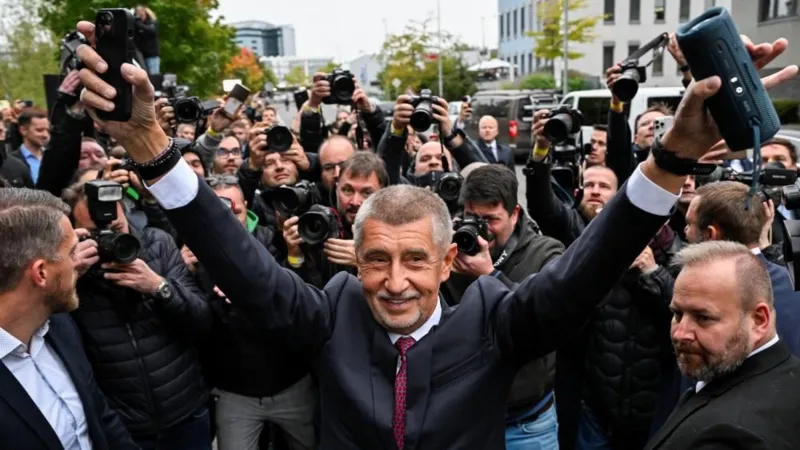Billionaire populist Andrej Babis has claimed victory in the Czech Republic’s parliamentary elections, marking a striking political comeback for the former prime minister. Preliminary results show his centrist-populist party ANO leading the race with just under 35 percent of the vote, earning 81 seats in the 200-seat lower house. Though short of an outright majority, Babis now stands poised to begin coalition talks that could shape the future of Czech politics for years to come.
The election outcome was widely anticipated. For months, opinion polls consistently placed Babis and his ANO party ahead of the fractured center-right coalition government, which struggled to maintain public confidence amid rising living costs and voter fatigue. Few expected ANO to secure enough seats for single-party rule, and that prediction proved accurate.
With the results now confirmed, Babis is expected to be invited by President Petr Pavel to begin negotiations to form a new government. The path ahead, however, is uncertain and potentially turbulent. The two likeliest partners for ANO are smaller right-wing parties that barely crossed the five-percent threshold: the Motorists for Themselves party, known for its opposition to EU climate rules, and the Freedom and Direct Democracy (SPD) party, led by Czech-Japanese businessman Tomio Okamura.
Early indications suggest Babis will seek a partnership with both to secure a working majority. Analysts say that while the Motorists share ANO’s skepticism toward EU environmental policies, the SPD alliance could prove more challenging due to its far-right leanings and internal divisions.
The Motorists for Themselves movement, a new but vocal player in Czech politics, campaigns heavily against the European Union’s Green Deal and aims to block the bloc’s 2035 ban on new petrol and diesel cars. Its appeal to rural and working-class voters mirrors that of ANO, particularly among those frustrated by rising energy prices.
Babis himself has taken a firm stance against EU environmental directives, vowing to shield Czech households from “unrealistic” European climate targets. He has also positioned himself as a defender of national sovereignty against what he describes as bureaucratic overreach from Brussels.
The SPD, meanwhile, presents a more complicated equation. Known for its anti-immigration rhetoric and staunch opposition to both NATO and the EU, the party’s ideology may clash with Babis’s pragmatic populism. While ANO and SPD agree on limiting migration and reducing EU influence, Okamura’s hardline demands, such as holding a referendum on EU membership, are likely to meet resistance from Babis.
During the campaign’s closing days, Babis amplified nationalist themes, accusing the outgoing government of neglecting Czech citizens in favor of Ukrainian refugees. His slogan that “Czech mothers get nothing, Ukrainians get everything” struck a chord among some voters but drew criticism for stoking social division.
Okamura, however, went further, calling for mass deportations of Ukrainian refugees; a proposal Babis is unlikely to support. Insiders suggest the former prime minister sees the issue more as a political tool than a policy priority.
If coalition talks stall, Babis may opt to form a minority government, relying on ad hoc support from the Motorists and SPD on key votes. This would not be unprecedented in Czech politics and could allow him to maintain flexibility while avoiding the instability of a formal coalition.
Despite criticism from his opponents, Babis remains one of the country’s most influential figures. His image as a self-made billionaire and political outsider continues to resonate with voters weary of traditional parties and economic stagnation.
The former prime minister’s campaign centered on economic recovery, national security, and skepticism toward EU regulations. His messaging, though populist, was carefully calibrated to appeal to both the middle class and blue-collar voters who feel left behind.
Observers note that this election also reflects a broader trend in Europe, where populist movements are regaining ground amid discontent with mainstream political elites. Babis’s resurgence places him alongside figures such as Hungary’s Viktor Orban and Italy’s Giorgia Meloni, who share similar nationalist and euroskeptic platforms.
European Union leaders are watching closely. A coalition led by Babis could complicate EU negotiations on climate policy and migration, especially as Brussels seeks greater unity on energy and defense. His ties to Orban and Austria’s Herbert Kickl, through their “Patriots for Europe” alliance, suggest the Czech Republic may drift further from Brussels on key policy fronts.
For now, the focus remains on coalition talks in Prague. Babis has said he hopes to form a government “that reflects the will of the people and restores dignity to Czech politics.” His ability to do so will depend on whether he can balance ambition with pragmatism in a fragmented political landscape.
If successful, Babis’s return to power will mark one of the most notable political comebacks in post-communist Europe. If not, the Czech Republic may be headed for another round of political gridlock and possibly early elections.



